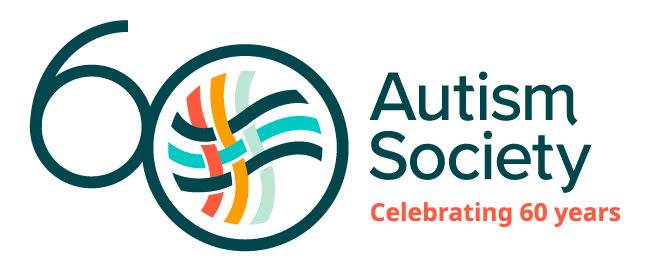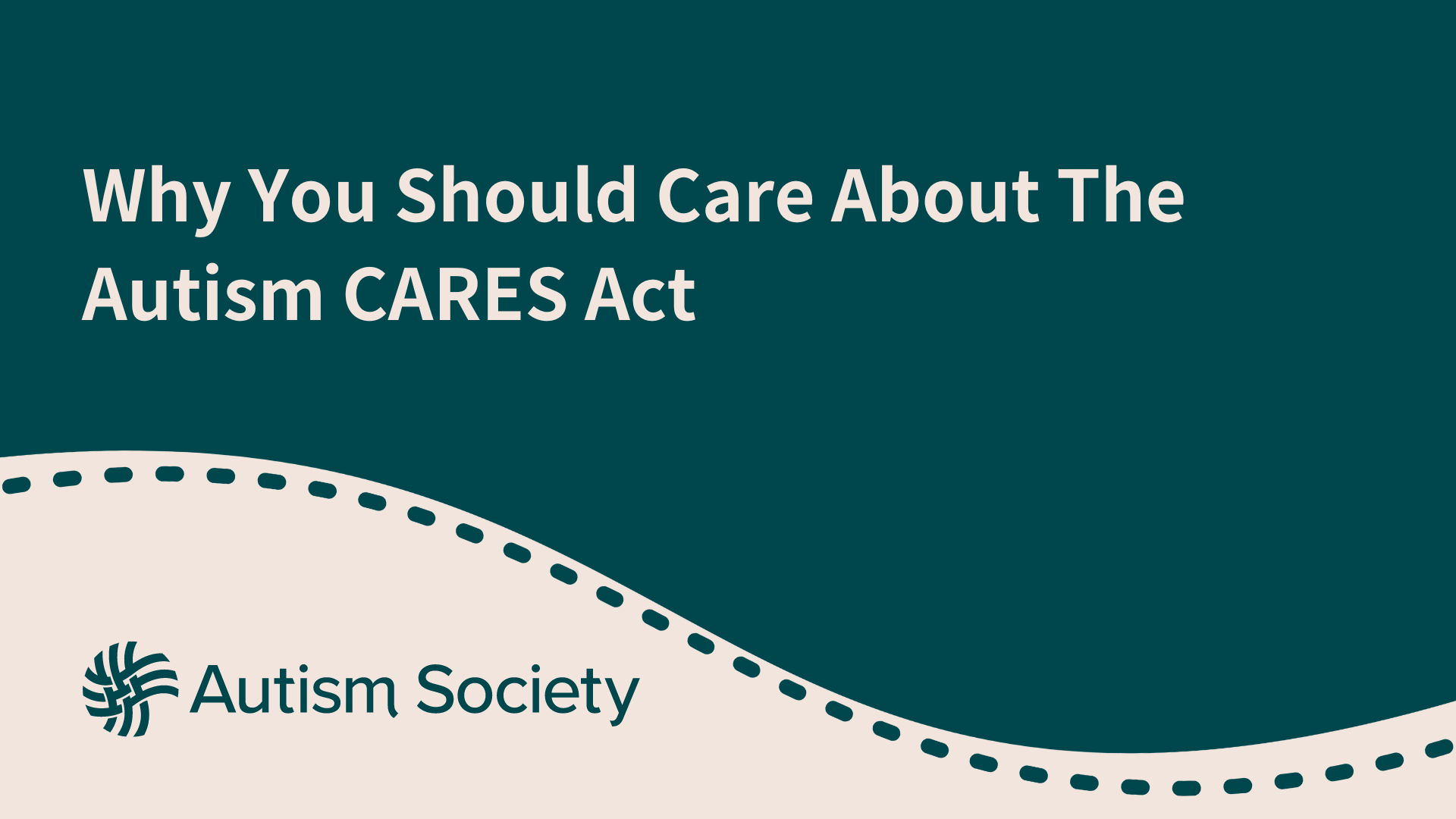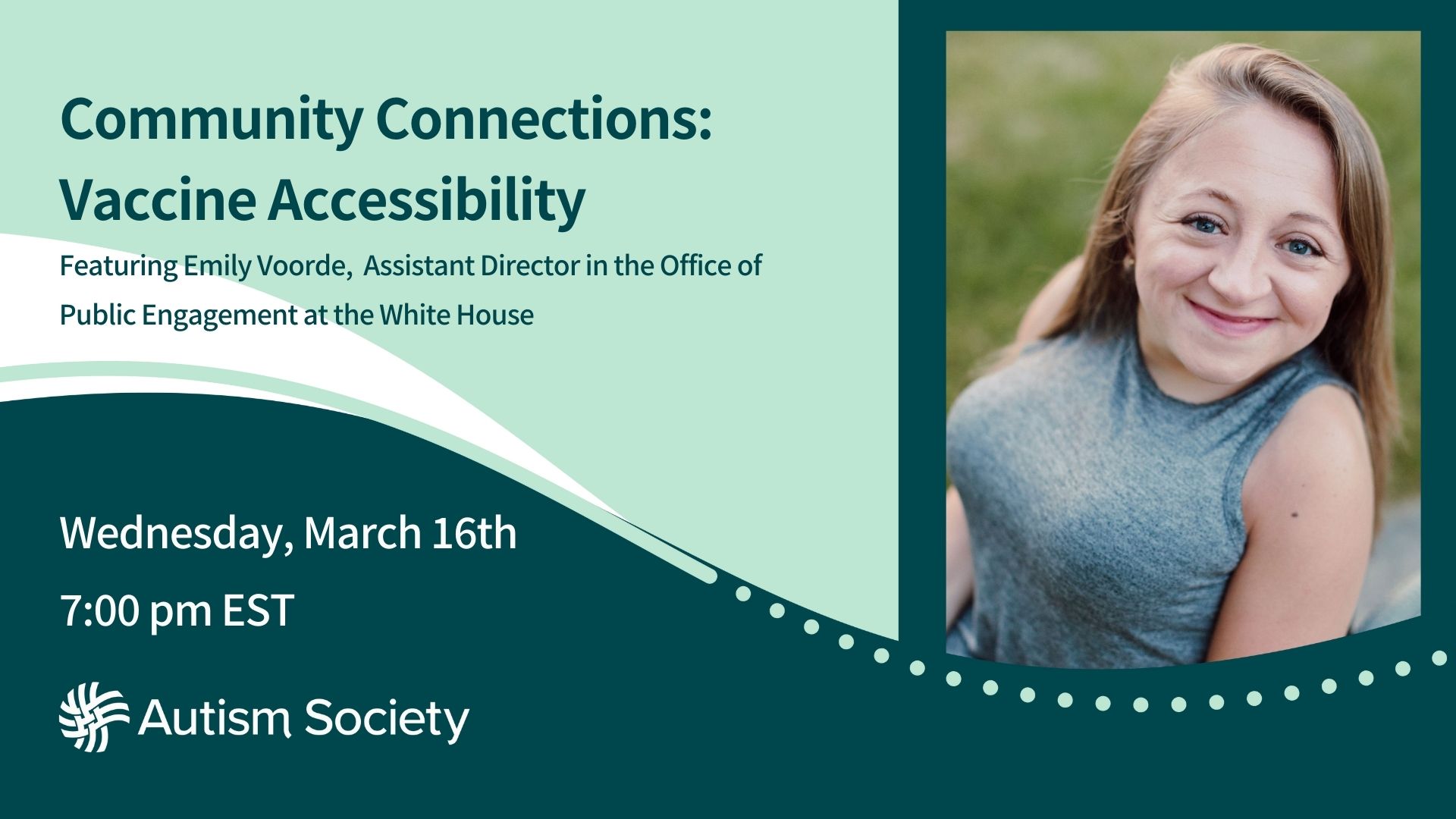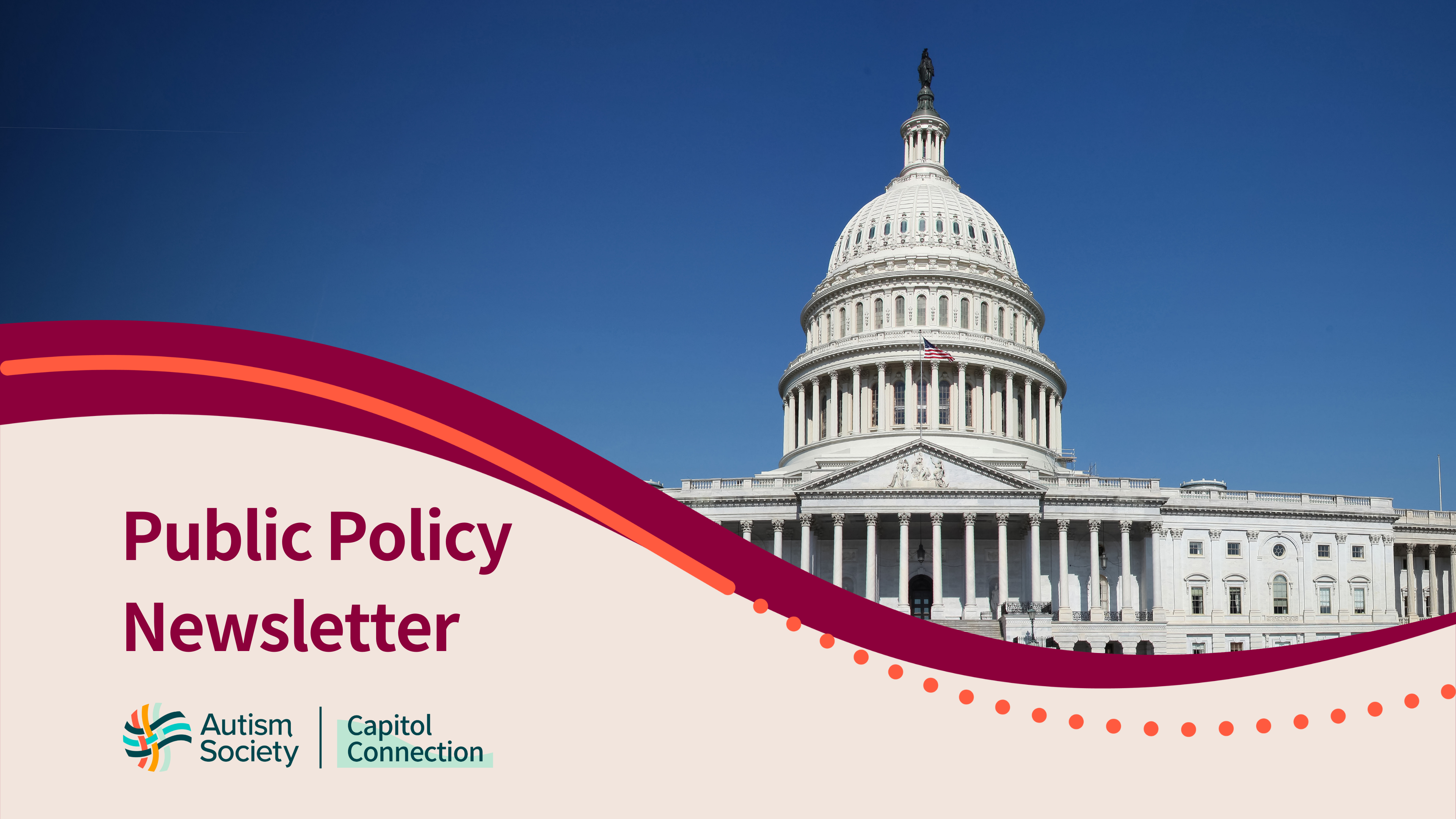
In this issue of Capitol Connection, find information to register for the Disability Policy Seminar, final appropriations negotiations, early childhood education legislation, and a new DOJ settlement on restraints and seclusion in Maryland, among other updates. While the House and Senate are in recess until February 28, it is a great time to use the Autism Society’s Action Center to educate Congress about these and other issues impacting the Autism community.
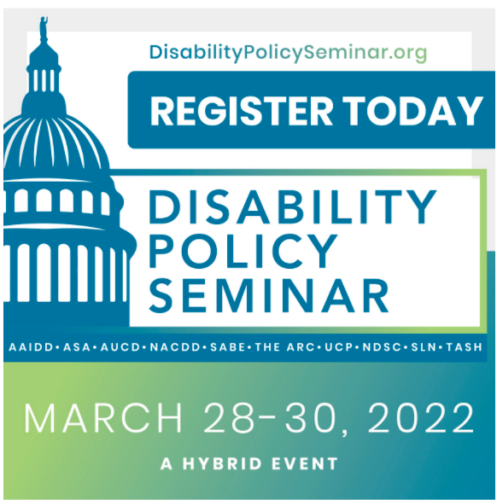
Disability Policy Seminar 2022
Planning is underway for this year’s Disability Policy Seminar (DPS) taking place in Washington, DC, March 28-30, 2022. There will be a rally on Capitol Hill on the morning of March 30 where participants will hear from some of our Hill champions and from the White House. Some states are also allowing in-person meetings with representatives to resume. Early bird registration rates expire on Sunday, March 13, 2022. (Rates will increase after this date.)
Appropriations Update
The Senate cleared (65-27) a short-term continuing resolution (CR) last week one day before the February 18 deadline. The new CR (HR 6617), which passed the House the week of February 7 extends current funding through March 11. It provides another three weeks to pass an overdue omnibus appropriations package for the fiscal year that began last October. President Biden signed the resolution.
The Autism Society of America helped to develop and signed on to several letters urging Congress to pass an omnibus appropriations bill and avoid a full-year continuing resolution. The first letter is from the entire Consortium for Citizens with Disabilities (CCD) to Congressional leadership urging passage of the omnibus bill. The Autism Society also signed on to an Education Task Force letter with a similar message but a focus on education issues. Finally, the Autism Society signed on to a letter calling for human needs funding to reflect current levels of need, not prolonged flat funding. The letter was signed by 353 organizations nationwide. See also a table and analysis of the FY 2022 funding bills.
House Hearing on School Climate
The House Subcommittee on Early Childhood, Elementary, and Secondary Education held a hearing entitled Serving All Students: Promoting a Healthier, More Supportive School Environment. This hearing focused on ways schools can be safer, especially for communities that include students with disabilities and of color. The founder of the Alliance Against Seclusion and Restraint, Guy Stephens, stressed the disproportionality students with disabilities face in restraint and seclusion practices at school. Mr. Stephens also discussed the trauma and risk of injury students face after experiencing these harmful practices. Following this hearing, CCD sent a letter requesting a markup for the Keeping All Students Safe Act, which has 100 House cosponsors, to help move the legislation forward.
Early Childhood Education
The co-chairs of the CCD Education Task Force wrote a letter in strong support of the reintroduction of the Funding Early Childhood is the Right IDEA Act (H.R. 6532/S.3544). This bill is a bipartisan, bicameral bill to restore full funding for educational and early-intervention services for children with disabilities under Part C and section 619. Representatives Mark DeSaulnier, Rodney Davis, and Jared Huffman, and Senators Maggie Hassan, Bob Casey, Chris Murphy, and Chris Van Hollen are the lead co-sponsors of the bill. The letter was sent to the chairs and ranking Members of the House and Senate education committees.
Office of Civil Rights Meeting
The Autism Society participated in a listening session with officials from the Department of Justice’s Office on Civil rights held on February 15. The Civil Rights Division enforces federal laws that protect you from discrimination based on your race, color, national origin, disability status, sex, religion, familial status, or loss of other constitutional rights. Topics brought forward by national disability organizations included civil rights related to community living, minimum wages, inclusive education free from abuse, health and mental health, and criminal justice. OCR officials stated that these types of listening sessions will be ongoing. They also encouraged individuals who may have had their civil rights violated to file complaints directly with the OCR.
New DOJ Voting Guidance
The Department of Justice released new guidance on how to ensure Ballot Drop Boxes are fully accessible. The six-page guidance is published here and was added as a part of the ADA Checklist for polling places. The ADA Checklist for Polling Places covers the accessibility requirements for features that may be present at a ballot drop box location, such as parking, passenger drop-off areas, and building entrances.
Violence Against Women Act
A bill to reauthorize the Violence Against Women Act (VAWA – S. 3623), was introduced in the Senate last week after long negotiations. It now has 21 bipartisan co-sponsors. The bill will likely be taken up after the February recess. A companion bill already passed in the House last year (HR 1620). The original law was signed in 1994 by then-President Bill Clinton and includes women with disabilities under its protections. The law also authorized the Office on Violence Against Women within the Department of Justice. See more details in this NPR report.
CDC Act Early
Last week the Centers for Disease Control and Prevention (CDC) unveiled its revised version of the developmental milestone checklist, which helps caregivers and physicians identify children with Autism and developmental disabilities. Developed with the American Academy of Pediatrics (AAP) as part of the CDC’s, “Learn the Signs. Act Early.” program, the efforts strongly support the Autism Society’s advocacy to push for earlier and better screening and diagnosis. See the Autism Society’s statement summarizing the changes.
Mental Health
Mental Health: 988 Hotline
The Arc published a summary of the Centers for Medicare and Medicaid Services (CMS) guidelines on the implementation of the 988 suicide prevention and mental health crisis hotline. The guidance is an excellent rubric for states to follow when beginning to implement safe, accessible, equitable, and police-free mobile response services in anticipation of the launch in July 2022 of 988, the national suicide and mental health crisis number. The CMS guidance is a product of the American Rescue Plan Act (ARPA). As part of ARPA, Congress created an 85 percent Federal Medicaid Assistance Percentage (FMAP) for mobile response services. This means that the federal government will cover 85 percent of the cost of states’ mobile response services, with the states responsible for the remaining 15 percent. The FMAP funding is a 3- year federal match that will start in April 2022 and can be used within a 5-year time span. Additionally, ARPA awarded $15 million in planning grants to help 20 states build a mobile response infrastructure.
White House Black History Month Event
On February 10, the White House continued its acknowledgment and celebration of Black History Month by hosting a discussion of mental health within the Black community. The panel was introduced and moderated by Susan Rice, the current Assistant Secretary of State for African Affairs. Panelists included Dr. Miriam Delphin-Rittmon, who serves as Assistant Secretary for Mental Health and Substance Abuse; Taraji P. Henson, a Golden Globe recipient who founded a nonprofit dedicated to ending the stigma surrounding mental health in the Black community; Sloan Stephens, an accomplished professional tennis player who advocates for mental health among athletes; and Nneka Ogwukime who while serving as the president of the WNBA Players Association advocated for social justice including mental health efforts.
The conversations with the panel centered around each woman’s advocacy work concerning mental health. See also the White House proclamation on Black History.
State Advocacy
Maryland Restraints and Seclusion Settlement
The Department of Justice’s Civil Rights Division and the U.S. Attorney’s Office for the District of Maryland announced in December a settlement agreement with the Frederick County Public School District in Maryland to address the discriminatory use of seclusion and restraint against students with disabilities. The department’s investigation found that the school district unnecessarily and repeatedly secluded and restrained students in violation of Title II of the Americans with Disabilities Act (ADA). Under the settlement, Frederick County will end the use of seclusion, overhaul its restraint practices, and train staff on the use of appropriate behavioral interventions for students with disabilities. Although students with disabilities make up only 11% of students enrolled in the district, every single student the district secluded was a student with disabilities, as were 99% — all but one — of the students the district restrained. Under the settlement agreement, the school district will take proactive steps to ensure that its practices do not discriminate against students with disabilities. While the Autism Society of Howard County MD was not directly involved in this settlement, the affiliate is advocating for alternatives to restraints and seclusion statewide.
Direct Support Workforce
The National Association of State DD Services (NASDDDS) provides data on the nature and scope of the workforce crisis. The new report with 2020 (pandemic) data was recently published. Here are links to the report and COVID supplement: 2020 NCI-IDD Staff Stability Survey Report And the 2020 NCI-IDD Staff Stability Survey Report – COVID-19 SUPPLEMENT
This report can be used to advocate for additional state support for the direct support workforce.
New Health and Human Services Policies and Fact Sheets Related to COVID19
- The CDC has published new guidance for the moderately or severely immunocompromised that recommends additional boosters.
- On Feb. 4, the HHS Office for Civil Rights (OCR) issued guidance for health care providers on civil rights protections for people with disabilities under Section 504 of the Rehabilitation Act and Section 1557 of the Affordable Care Act.
- The Administration for Community Living created this fact sheet to explain how to get reimbursement for in-home COVID tests.
- The Center for Medicare and Medicaid (CMS) released updates to the toolkit on coverage and reimbursement of COVID-19 vaccines, vaccine administration, and cost-sharing under Medicaid, and the Children’s Health Insurance Program.
- See also the Autism Society’s Vaccine Education Initiative website for more resources.
Share:

